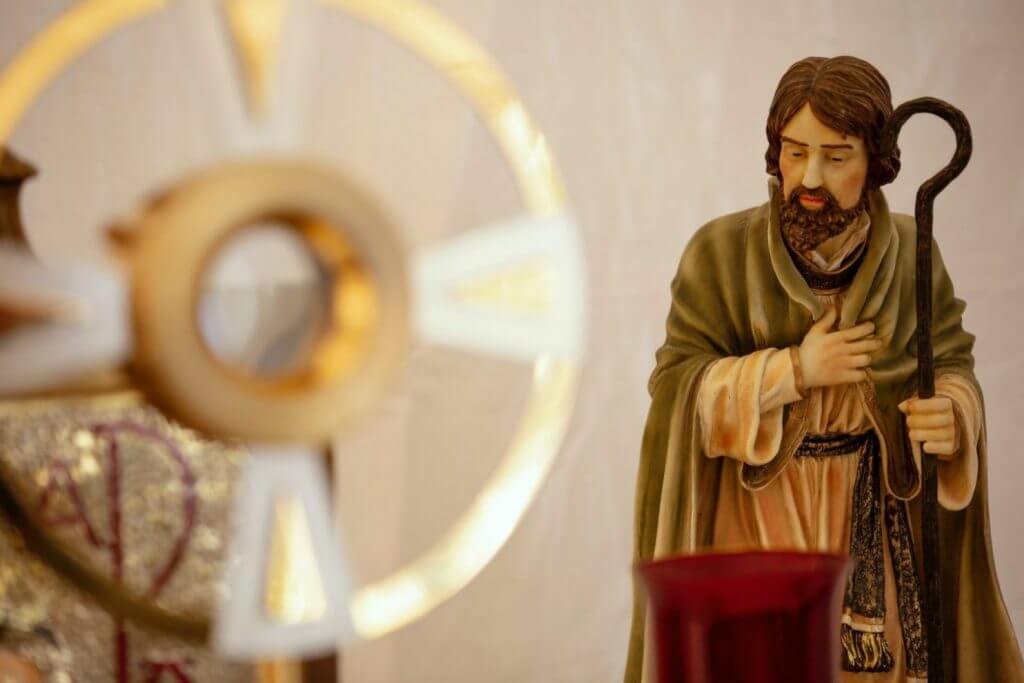The present Liturgical Year has been declared a special year of St. Joseph.
Lord knows we need his intercession right now more than ever, but we won’t go into that.
Instead, in order to prepare ourselves properly to celebrate this year, let us reflect: who is St. Joseph?
He was a carpenter, which is to say a relatively respectable man in his community. Not wealthy, but what we might call comfortable, as he was able to travel and seek accommodations at an inn; though for a temple sacrifice, he could only afford the two turtledoves reserved for the less wealthy. He was what we might call a skilled tradesman, though he was of noble blood through at least two lines.
We are told he was a righteous man, as would only make sense. There is a venerable tradition that, like his wife, he had taken a vow of perpetual virginity from a young age. Certainly, he cared for and guarded the Blessed Virgin and her Divine Son for as long as he lived.
He is not directly quoted in Scripture at any point, though he serves as the protagonist of St. Matthew’s introductory material. This tells us of his doubts regarding whether to take his betrothed into his house after she was found with child (which the Saints tell us was not because he doubted her purity, but because he doubted his worthiness to be part of the Divine scheme) and of his angelically guided efforts to evade the persecutions of Herod.
More important than any of these details is the nature of his mission.
St. Joseph was the man fitted by God the Father to stand in His place to God the Son: the man who taught God to be a man.
In that curious household the natural hierarchy of the family—father, mother, child—was reversed: the child was greatest, the mother next in prominence, the father next after her. And yet (for such is the nature of goodness) at the same time it was not reversed. The Divine Child, we are told, was obedient to His human parents (Luke 2:51), and His immaculate mother was likewise obedient to her husband.
Responsibility thus fell to St. Joseph of caring for God’s two most perfect works. As Pharaoh elevated the Patriarch Joseph as his steward, so God made St. Joseph “master of his house and ruler of all his possession” (Psalms 104: 21).
How is a man to stand in place of God?
It turns out that the answer is much less terrible than we might think. St. Joseph fulfilled his role as the steward of God simply by doing what every good man does: by protecting, providing for, and presiding over his own little household.
The world reeled about him, with tyrants, occupying armies, laws, politics, and all the rest of it, and all the while he kept and cared for what was entrusted to him. He could not challenge the power of Caesar Augustus, nor stop the outrageous slaughter of King Herod. All he could do—and all that was asked of him—was to keep his own safe by fleeing first into Egypt and then settling in the out-of-the-way town of Nazareth. He then spent the rest of his life, so far as we know, laboring to provide for his family’s needs and benefits and passing on whatever he had to pass on to his Divine Son in order that He might “advance in wisdom, and age, and grace with God and men” (Luke 2:52).
That was all and that was enough.
We today are often caught up in what might be termed the careerist mindset: the idea that a man (or woman) is defined by his career, which is and ought to be an expression and fulfillment of his own identity. Family is rather awkwardly fit in as a secondary or, at best, an equal expression of that same identity: a ‘lifestyle choice’ as it were.
St. Joseph points us to the opposite approach. A man does not live for himself, but for those who have been entrusted to him. His ‘career,’ if he has one, is for the sake of providing for those in his care, of giving them what they need and what is for their benefit. He must guard them against external threats, whether physical or spiritual (hence why it would be unthinkable for the Holy Family to remain in Egypt: a land of idolatry), and he must pass on what he himself has received.
In short, the model of St. Joseph is of a life centered on family: on the particular, immediate responsibilities that have been entrusted to us. For some men, there may be another or a different responsibility entrusted to their care: the souls of his diocese for a priest, for instance, or the welfare of his nation for a king. But for those of us who are married or who intend to be married, it is most likely to consist chiefly of one small household: our wife and children. Every other aspect of our lives—our career, our possessions, our interests, the outside world—ought to exist relative to this central duty.
If we do this well, then we will have done the work of a man.
This year, seek to cast off the worldly mindset of today and put on that of St. Joseph. Turn your gaze away from the news, your career, and the hustle and worry of the world and recenter your life on what is immediately under your care: on the household that has been entrusted to you.
Because for the vast majority of us, that is what God has appointed as our chief task in life. And after the example of St. Joseph, let no man say this is a little thing.


